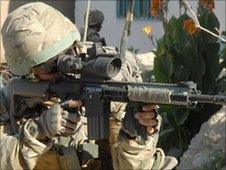MoD denies Britain had 'eyes shut' over Helmand
- Published

8,000 British troops are based in Helmand
The Ministry of Defence has denied a former commander's claims that Britain sent troops into Helmand province with "eyes shut and fingers crossed".
In an interview in the Times, Maj Gen Andrew Mackay said Labour's "complacent" approach to the Afghan mission had proved "very costly".
But the MoD insisted the campaign "followed careful analysis" and had helped combat a "resurgent" Taliban.
Nearly 300 British servicemen and women have died in the country since 2001.
Another British soldier died on Tuesday, during a gun battle in Helmand.
The soldier, from 3rd Regiment Royal Horse Artillery, attached to 4th Regiment Royal Artillery, became the 293rd to die since operations in Afghanistan began.
'Unpalatable choices'
Gen Mackay, who left the Army last year, told the newspaper: "Anyone with any genuine experience of this counter-insurgency business understands that it is hellishly difficult and that mistakes, cock-ups and friction are a permanent feature.
"The issue is whether or not our politicians, diplomats, intelligence services, civil servants and senior military have done enough, adapted enough, been innovative enough or courageous enough to make tough, and more often than not, unpalatable choices.
"My answer to that question is that they have not or have failed to do so too often.
"Muddling through seems to be the default setting, along with the protection of individual and collective interests."
Maj Gen Mackay, a former commander in Helmand, added: "The genesis of this approach is born of complacency, the thought that 'we can deal with it as and when it happens'.
"It resulted, I believe, in the upper echelons of government going into Helmand with their eyes shut and their fingers crossed.
"For those who fought and died or suffered injuries in that period, this proved a very costly means of conducting counter-insurgency."
Another former commander in Helmand, Brigadier Ed Butler, said planners had under-estimated the threat in the area, as attention was so focussed on Iraq at the time.
But the MoD said the deployment helped to counter a "growing threat of a resurgent Taliban".
"Given the importance of the mission to UK national interests and our leading role in Nato, the UK decided to support this decision by deploying its forces to Helmand, along with several other nations," the department said.
"In common with many of our international partners in Afghanistan, we have had to adapt our approach and force levels to reflect developments on the ground.
"During the first six months of the UK deployment to Helmand, we increased our force levels by over a third in response to the situation there.
"The new government has made clear that the mission in Afghanistan is imperative for our national security and its commitment to ensure that it succeeds."
Foreign security
There are currently 8,000 British troops in Helmand.
On Tuesday, UK Defence Secretary Dr Liam Fox said UK troops would stay until Afghanistan was "stable enough" to ensure internal and foreign security.
Nato commanders had discussed moving the UK's forces in Helmand to neighbouring Kandahar province when Canada pulls out its contingent there next year, but Dr Fox said this was "highly unlikely".
And earlier in the week, Prime Minister David Cameron restated his support for American strategy in Afghanistan during talks with US Defence Secretary Robert Gates.